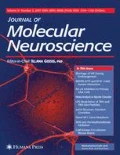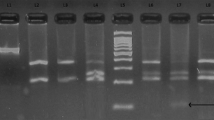Abstract
The association of E670G (rs505151) polymorphism in PCSK9 gene with an increased risk of coronary artery disease (CAD) and ischemic stroke (IS) was reported in previous studies. We investigated the effect of the E670G (rs505151) on the risk of CAD and IS in a Tunisian cohort. Genotyping of the PCSK9 E670G was performed using polymerase chain reaction (PCR)-based restriction fragment length polymorphism (RFLP) and then confirmed by direct sequencing. The frequency of the 670G allele was significantly higher in the CAD than in the no-CAD subgroup (0.132 vs. 0.068, p = 0.030). As expected, the incidence of E670G was significantly important in IS subgroup than control group (0.122 vs. 0.073, p = 0.032). Furthermore in CAD patients, the 670G carriers showed significantly increased plasma total cholesterol and LDL-cholesterol levels compared to E670 carriers (6.78 [6.47–7.00] vs. 4.92 [4.02–5.46] mmol/l, p < 0.0001 and 4.60 [4.00–5.04] vs. 3.00 [2.22–3.70] mmol/l p = 0.001, respectively). The risk and severity of CAD were significantly increased in 670G carriers between no-CAD subgroup and CAD patients presenting a stenosis ≥50 % in two or three major coronary arteries (0.068 vs. 0.198, p = 0.001, OR = 3.39 [1.55–7.37]). The E670G polymorphism of the PCSK9 gene is mainly associated with a increased risk and severity of CAD and IS in Tunisian cohort.
Similar content being viewed by others
References
Abboud S, Karhunen PJ, Lütjohann D, Goebeler S, Luoto T, Friedrichs S et al (2007) Proprotein convertase subtilisin/kexin type 9 (PCSK9) gene is a risk factor of large-vessel atherosclerosis stroke. PLoS ONE 2:e1043
Abdel-Maksoud MF, Eckel RH, Hamman RF, Hokanson JE (2012) Risk of coronary heart disease is associated with triglycerides and high-density lipoprotein cholesterol in women and non-high-density lipoprotein cholesterol in men. J Clin Lipidol 6:374–381
Abifadel M, Rabes JP, Boileau C, Varret M (2007) After the LDL receptor and apolipoprotein B, autosomal dominant hypercholesterolemia reveals its third protagonist: PCSK9. Ann Endocrinol (Paris) 68:138–46
Abifadel M, Varret M, Rabes JP, Allard D, Ouguerram K, Devillers M et al (2003) Mutations in PCSK9 cause autosomal dominant hypercholesterolemia. Nat Genet 34:154–6
Abifadel M, Rabès JP, Devillers M, Munnich A, Erlich D, Junien C et al (2009) Mutations and polymorphisms in the proprotein convertase subtilisin kexin 9 (PCSK9) gene in cholesterol metabolism and disease. Hum Mutat 30:520–9
Aung LH, Yin RX, Miao L, Hu XJ, Yan TT, Cao XL et al (2011) The proprotein convertase subtilisin/kexin type 9 gene E670G polymorphism and serum lipid levels in the Guangxi Bai Ku Yao and Han populations. Lipids Health Dis 10:5
Belanger Jasmin S (2011). A putative role for PCSK9 in synaptic remodelling and plasticity in response to brain injury: implications for Alzheimer's disease. McGill University (http://digitool.library.mcgill.ca/webclient/StreamGate?folder_id=0&dvs=1352716244239~284) 59–83
Benjannet S, Rhainds D, Essalmani R, Mayne J, Wickham L, Jin W et al (2004) NARC- 1/PCSK9 and its natural mutants: zymogen cleavage and effects on the low density lipoprotein (LDL) receptor and LDL cholesterol. J Biol Chem 279:48865–75
Chan DC, Watts GF (2012) Postprandial lipoprotein metabolism in familial hypercholesterolemia: thinking outside the box. Metabolism 61:3–11
Chen SN, Ballantyne CM, Gotto AM Jr, Tan Y, Willerson JT, Marian AJ (2005) A common PCSK9 haplotype, encompassing the E670G coding single nucleotide polymorphism, is a novel genetic marker for plasma low density lipoprotein cholesterol levels and severity of coronary atherosclerosis. J Am Coll Cardiol 45:1611–9
Cohen J, Pertsemlidis A, Kotowski IK, Graham R, Garcia CK, Hobbs HH (2005) Low LDL cholesterol in individuals of African descent resulting from frequent nonsense mutations in PCSK9. Nat Genet 37:161–5
Costet P, Cariou B, Lambert G, Lalanne F, Lardeux B, Jarnoux AL et al (2006) Hepatic PCSK9 expression is regulated by nutritional status via insulin and sterol regulatory element-binding protein 1c. J Biol Chem 281:6211–8
Cunningham D, Danley DE, Geoghegan KF, Griffor MC, Hawkins JL, Subashi TA et al (2007) Structural and biophysical studies of PCSK9 and its mutants linked to familial hypercholesterolemia. Nat Struct Mol Biol 14:413–419
Evans D, Beil FU (2006) The E670G SNP in the PCSK9 gene is associated with polygenic hypercholesterolemia in men but not in women. BMC Med Genet 31:66
Expert Committee on the Diagnosis and Classification of Diabetes Mellitus (2003) Report of the expert committee on the diagnosis and classification of diabetes mellitus. Diabetes Care 26:S5–S20
Ferri N, Tibolla G, Pirillo A, Cipollone F, Mezzetti A, Pacia S et al (2012) Proprotein convertase subtilisin kexin type 9 (PCSK9) secreted by cultured smooth muscle cells reduces macrophages LDLR levels. Atherosclerosis 220:381–386
Friedewald WT, Levy RI, Fredrickson DS (1972) Estimation of the concentration of low-density lipoprotein cholesterol in plasma, without use of the preparative ultracentrifuge. Clin Chemistry 6:499–502
Gotto AM Jr, Moon JE (2012) Management of cardiovascular risk. The importance of meeting lipid targets. Am J Cardiol 110(1 Suppl):3A–14A
Hampton EN, Knuth MW, Li J, Harris JL, Lesley SA, Spraggon G (2007) The self-inhibited structure of full-length PCSK9 at 1.9 a reveals structural homology with resistin within the C-terminal domain. Proc Natl Acad Sci U S A 104:14604–14609
Hobbs HH, Russell DW, Brown MS, Goldstein JL (1990) The LDL receptor locus in familial hypercholesterolemia: mutational analysis of a membrane protein. Annu Rev Genet 24:133–170
Hsu LA, Teng MS, Ko YL, Chang CJ, Wu S, Wang CL et al (2009) The PCSK9 gene E670G polymorphism affects low-density lipoprotein cholesterol levels but is not a risk factor for coronary artery disease in ethnic Chinese in Taiwan. Clin Chem Lab Med 47:154–8
Huang CC, Fornage M, Lloyd-Jones DM, Wei GS, Boerwinkle E, Liu K (2009) Longitudinal association of PCSK9 sequence variations with low-density lipoprotein cholesterol levels: the Coronary Artery Risk Development in Young Adults Study. Circ Cardiovasc Genet 2:354–61
Kotowski IK, Pertsemlidis A, Luke A, Cooper RS, Vega GL, Cohen JC et al (2006) A spectrum of PCSK9 alleles contributes to plasma levels of low-density lipoprotein cholesterol. Am J Hum Genet 78:410–22
Kwon HJ, Lagace TA, McNutt MC, Horton JD, Deisenhofer J (2008) Molecular basis for LDL receptor recognition by PCSK9. Proc Natl Acad Sci U S A 105:1820–1825
Lagace TA, Curtis DE, Garuti R, McNutt MC, Park SW, Prather HB et al (2006) Secreted PCSK9 decreases the number of LDL receptors in hepatocytes and in livers of parabiotic mice. J Clin Invest 116:2995–3005
Lambert G, Charlton F, Rye KA, Piper DE (2009) Molecular basis of PCSK9 function. Atherosclerosis 203:1–7
Lambert G, Jarnoux AL, Pineau T, Pape O, Chetiveaux M, Laboisse C (2006) Fasting induces hyperlipidemia in mice overexpressing proprotein convertase subtilisin kexin type 9: lack of modulation of very-low-density lipoprotein hepatic output by the low density lipoprotein receptor. Endocrinology 147:4985–95
Mathers CD, Loncar D (2006) Projections of global mortality and burden of disease from 2002 to 2030. PLoS Med 3:e442
Mbikay M, Sirois F, Mayne J, Wang GS, Chen A, Dewpura T (2010) PCSK9-deficient mice exhibit impaired glucose tolerance and pancreatic islet abnormalities. FEBS Lett 584:701–706
Miller SA, Dykes DD, Polesky HF (1988) A simple salting out procedure for extracting DNA from human nucleated cells. Nucleic Acids Res 16:1215
Mousavi SA, Berge KE, Leren TP (2009) The unique role of proprotein convertase subtilisin/kexin 9 in cholesterol homeostasis. J Intern Med 266:507–519
Norata GD, Garlaschelli K, Grigore L, Raselli S, Tramontana S, Meneghetti F et al (2010) Effects of PCSK9 variants on common carotid artery intima media thickness and relation to ApoE alleles. Atherosclerosis 208:177–82
Ouguerram K, Chetiveaux M, Zair Y, Costet P, Abifadel M, Varret M et al (2004) Apolipoprotein B100 metabolism in autosomal-dominant hypercholesterolemia related to mutations in PCSK9. Arterioscler Thromb Vasc Biol 24:1448–53
Polisecki E, Peter I, Robertson M, McMahon AD, Ford I, Packard C et al (2008) Genetic variation at the PCSK9 locus moderately lowers low-density lipoprotein cholesterol levels, but does not significantly lower vascular disease risk in an elderly population. Atherosclerosis 200(1):95–101
Rousselet E, Marcinkiewicz J, Kriz J, Zhou A, Hatten ME, Prat A et al (2011) PCSK9 reduces the protein levels of the LDL receptor in mouse brain during development and after ischemic stroke. J Lipid Res 52:1383–91
Saely CH, Drexel H (2013) Is type 2 diabetes really a coronary heart disease risk equivalent? Vascul Pharmacol 59:11–8
Scartezini M, Hubbart C, Whittall RA, Cooper JA, Neil AH, Humphries SE (2007) The PCSK9 gene R46L variant is associated with lower plasma lipid levels and cardiovascular risk in healthy U.K. men. Clin Sci (Lond) 113:435–41
Seidah NG, Benjannet S, Wickham L, Marcinkiewicz J, Jasmin SB, Stifani S et al (2003) The secretory proprotein convertase neural apoptosis-regulated convertase 1 (NARC-1): liver regeneration and neuronal differentiation. Proc Natl Acad Sci U S A 100:928–933
Seidah NG, Prat A (2007) The proprotein convertases are potential targets in the treatment of dyslipidemia. J Mol Med (Berl) 85:685–696
Stephens M, Sloan JS, Robertson PD, Scheet P, Nickerson DA (2006) Automating sequence-based detection and genotyping of SNPs from diploid samples. Nat Genet 38:375–81
Sun XM, Eden ER, Tosi I, Neuwirth CK, Wile D, Naoumova RP et al (2005) Evidence for effect of mutant PCSK9 on apolipoprotein B secretion as the cause of unusually severe dominant hypercholesterolaemia. Hum Mol Genet 14:1161–9
Wang JG, Staessen JA, Franklin SS, Fagard R, Gueyffier F (2005) Systolic and diastolic blood pressure lowering as determinants of cardiovascular outcome. Hypertension 45:907–13
Yin RX, Wu DF, Miao L, Aung LH, Cao XL, Yan TT et al (2012) Several genetic polymorphisms interact with overweight/obesity to influence serum lipid level. Cardiovasc Diabetol 11:123
Zhang B, Menzin J, Friedman M, Korn J, Russel B (2008) Predicted coronary risk for adults with coronary heart disease and low HDL-C: an analysis from the US National Health. and Nutrition Examination Survey. Curr Med Res Opin 24:2711–2717
Zhang DW, Lagace TA, Garuti R, Zhao Z, McDonald M, Horton JD et al (2007) Binding of proprotein convertase subtilisin/kexin type 9 to epidermal growth factor-like repeat A of low density lipoprotein receptor decreases receptor recycling and increases degradation. J Biol Chem 282:18602–12
Acknowledgments
We are indebted to the patients for their cooperation. This work was supported by grants from the Tunisian Ministries of Higher Education and Scientific Research.
Author information
Authors and Affiliations
Corresponding author
Rights and permissions
About this article
Cite this article
Slimani, A., Harira, Y., Trabelsi, I. et al. Effect of E670G Polymorphism in PCSK9 Gene on the Risk and Severity of Coronary Heart Disease and Ischemic Stroke in a Tunisian Cohort. J Mol Neurosci 53, 150–157 (2014). https://doi.org/10.1007/s12031-014-0238-2
Received:
Accepted:
Published:
Issue Date:
DOI: https://doi.org/10.1007/s12031-014-0238-2




